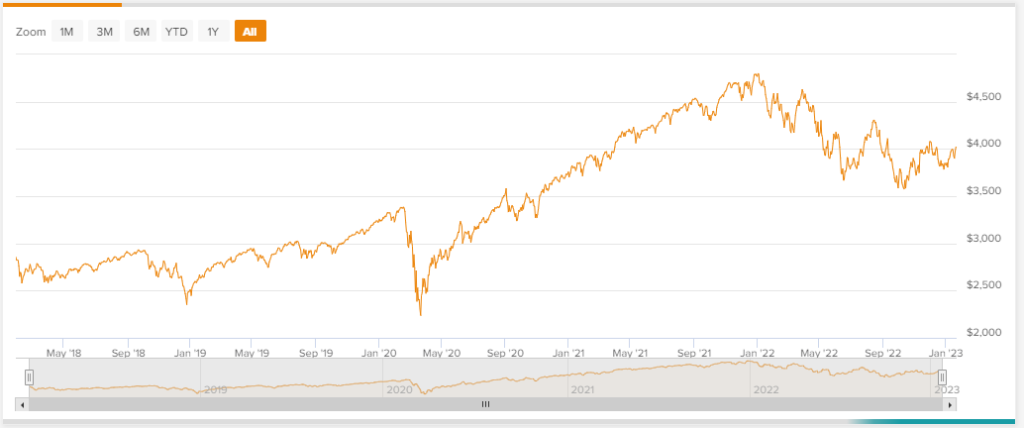Investing in 2022 was tough amid the Russia/Ukraine war, soaring energy prices, sky-high inflation, and rising rates. Moreover, companies faced the complicated task of posting good financial results alongside laying off employees, streamlining costs, and trying to improve sales.
Pick the best stocks and maximize your portfolio:
- Discover top-rated stocks from highly ranked analysts with Analyst Top Stocks!
- Easily identify outperforming stocks and invest smarter with Top Smart Score Stocks
Should investors expect a similar scenario in 2023?
To a certain extent, yes. Economies worldwide are bracing for a deeper downturn and slower growth. In its recent policy, the Federal Reserve stated that interest rates will continue to be on the rise, and people should expect a reduction only at the end of 2023 or early 2024. Owing to this, experts are expecting the U.S. to enter into a recessionary period in mid-2023.
At such times, investors fumble to find the right investment strategy. “Be Patient and Wait Out for Higher Future Returns” could be an apt investment mantra this year.
Here are three steps that could spell out an ideal investment strategy for 2023.
#1. Be Patient. Companies May Not Outperform Expectations
First and foremost, be ready to accept underperformance from the best of the companies this year. The after-effects of high inflation will reflect in companies’ financials in 2023. Analysts have already lowered expectations for most of the sectors but be ready to accept more downward revisions. This means that stock prices may not rise as much as expected. If you are an equity-only investor, be patient and wait for the financials to improve over time.
#2. Diversify, Diversify, Diversify!
A prudent investor must instill the habit of diversifying his investments in both the best and worst of times. An investor’s risk appetite plays an important role in diversification allocation. In 2023, an investor must consider distributing portions of his investments in fixed-income instruments, gold, and equity securities.
1) Government Bonds – Currently, U.S. Treasuries are offering decently-attractive yields, much better than the returns earned on some U.S. equity securities. The current yield on Two-Year Treasuries is 4.13%, while 10-Year Treasuries are yielding roughly 3.45%.
2) Investment-Grade Corporate Bonds – Good quality, investment-grade corporate bonds could also fetch a high yield during times of economic downturn. Currently, these bonds are offering approximately 5% returns, proving a safe investment option for income-savvy investors who are willing to take on a little bit of credit risk.
3) Gold – Historically, the precious yellow metal has proven to be a safe-haven investment during recessions and one of the best hedges against inflation. As per Statista, gold earned an annual average return of 0.4% in 2022. In 2023, however, gold has already gained over 6%. Importantly, gold prices may remain elevated this year owing to the weakening economy and a weaker U.S. dollar.
4) Stocks – In 2022, the S&P 500 index (SPX), a benchmark for U.S. listed equities generated a negative 19.44% return, implying just how volatile the stock market has been and the risks involved with investing in equities in a bear market.

Year-to-date, the SPX is up about 5%, but considering the macroeconomic headwinds mentioned above, it may not remain this way for long. Therefore, investors may want to choose to invest in highly-liquid, high-quality stocks with a wide moat and hold on until they realize reasonable stock price appreciation.
Notably, TipRanks offers a wide variety of tools, including analyst ratings, stock analysis, corporate insider trading, hedge fund tracking, financial blogger opinions, and website traffic analysis, to name a few. Investors can use these tools to make well-researched stock selections.
#3. Review and Rebalance Portfolio as the Market Changes
Most importantly, during stressful market scenarios, it is advisable to be an active investor. This means that an investor should constantly be in-the-know regarding how different market instruments are performing and rebalance his/her portfolio as and when required.
Final Thoughts
To sum it all up, investors must remain patient and have a longer-term view of their investments. Do not panic and make decisions based on short-term market movements. Also, be alert to the changing market scenario, be willing to rebalance your portfolio when necessary, and diversify your holdings to gain maximum investment returns.
With the help of TipRanks’ Smart Portfolio tool, investors can undertake a full analysis of their holdings. Additionally, the site provides stock news and has a streaming service to help investors stay updated with the latest market events.



















